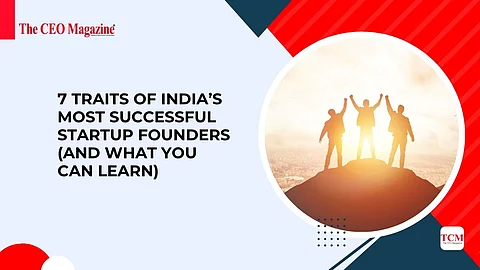
- News
- Women
- Magazine
- IndustryIndustry
- InsightsInsights
- Success Stories
- PublishPublish
- ContactContact
- Media KitMedia Kit

India’s Most Successful Startup
Ever wondered what separates good startup founders from the truly great ones in India?
Is it funding? Luck? Timing?
Sure, those factors matter — but there’s something far more powerful driving the success of founders like Nithin Kamath (Zerodha), Falguni Nayar (Nykaa), Bhavish Aggarwal (Ola), and Kunal Shah (CRED).
In my experience speaking with dozens of startup leaders, the real game-changer is the mindset — the traits they carry, day in and day out.
Let me show you the 7 traits I’ve seen again and again in India’s top startup founders — and how you can apply them right now, wherever you are in your journey.
Every successful founder I’ve met has this laser-sharp clarity of what they’re building and why.
Take Falguni Nayar, who left a 20-year career at Kotak Mahindra to start Nykaa at age 50 — not just to sell beauty products, but to redefine how Indian women shopped online.
Define your North Star. What exactly are you building and why does it matter?
Revisit and refine your vision often — especially when things get chaotic.
“You don’t build a business. You build people, and people build the business.”
— Zig Ziglar
One trait I consistently notice? Successful founders don’t wait to launch until everything’s perfect. They act, learn, iterate.
Kunal Shah famously said:
“In India, founders often wait for product-market fit to be perfect. The winners launch early, learn fast.”
Launch a Minimum Lovable Product — not perfect, but useful.
Speed beats polish in early stages. Make mistakes, but make them fast.
Great founders don’t just talk to customers — they obsess over them.
Nithin Kamath built Zerodha not by following market trends but by solving his own frustrations as a trader. Today, Zerodha is India’s largest brokerage, built without external funding.
Spend time with users weekly. Watch them use your product.
Obsess over feedback, not just revenue dashboards.
Pro Tip: Add a “Talk to Founder” button or email — you'll be surprised how much insight that brings.
If 2020 taught us anything, it’s this — resilience is not optional.
Startups like OYO and BYJU’S had to pivot rapidly during the pandemic. While some struggled, others adapted — shifting strategy, product, or even market.
Don’t fall in love with your idea. Fall in love with the problem.
Create contingency plans. What’s your Plan B and C?
“It is not the strongest who survive, but the most adaptable.”
— Charles Darwin
Top founders don’t copy Silicon Valley — they think from scratch, based on India’s unique context.
Example?
Zerodha avoided massive ad spends, relying instead on word-of-mouth and product-led growth — a decision rooted in India’s cost-conscious investor psyche.
Ask: “If I had no playbook, how would I solve this?”
Avoid assumptions. Question everything — even if “everyone else is doing it.”
Related keyword to explore: Startup mindset in India
Here’s a truth most founders underestimate:
Your network is not your net worth — it’s your survival system.
India’s top founders build deep, long-term relationships — with co-founders, investors, early employees, mentors.
Ritesh Agarwal (OYO) famously pitched over 100 times before raising capital — and each relationship helped refine his pitch, model, and resolve.
Nurture before you need. Connect before you pitch.
Join founder communities, investor circles, and mentorship programs.
Bonus Tip: Say yes to podcasts, panels, and meetups — you never know where your next investor or co-founder is sitting.
While the world chases unicorns, India’s best founders think in decades, not quarters.
Zoho’s Sridhar Vembu runs a profitable, billion-dollar tech company — entirely bootstrapped, with a village-based R&D model.
That’s not flashy, but it’s powerful.
Ask: Will this decision help me in 5 years, or just 5 months?
Build with patience. Don’t rush your runway for temporary growth.
India’s top founders don’t micromanage — they hire smart and delegate.
They don’t chase hype — they focus on fundamentals.
And they don’t give up easily, even when the world doubts them.
Pause and think:
Which of these 7 founder traits do you resonate with most?
Which one feels like a growth edge for you?
Write it down. Make a plan. Start today.
Because success isn’t reserved for the lucky — it’s built by those who show up with the right mindset, consistently.
Let me leave you with this:
“You are the average of your decisions, your discipline, and your mindset — not your funding round.”
Whether you’re just getting started or scaling your Series B, you have everything it takes to become one of India’s most successful startup founders.
Start by building the traits that last.
Follow us on Google News
